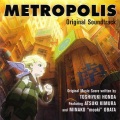
METROPOLIS Original Soundtrack
《大都会》一片,最初是德国表现主义电影大师朗格上世纪20年代的无声电影巨作。 影片隐含了“人性和高科技的冲突”、“集权势力和唯科技主义下的政治阴霾”等深刻主题, 还具备了当时西方现代主义艺术的诸多特点,具有极大的表现力和影响力。 到了50年代,日本漫画之父手冢治虫将这一题材改编成了一则中短篇漫画。 本来这不是一部特别突出的漫画,但当时作为手冢门徒的林太郎非常喜爱这一漫画。 终于在50年之后,运用最尖端的动画技术,林太郎了却夙愿,将《大都会》搬上了银幕。 作为科幻题材的动画 音乐上却大胆采用美国早期爵士——新奥尔良爵士的风格为主 十分具有梦幻魔力,同时,为表现出全片一种后工业时代的世界观 影片的配乐也结合了具有工业电子音效的配乐 主要的作曲家 本多俊之 是国际上著名的新一代日本爵士乐家 之前他已经为诸多著名日本电影配乐或演奏, 本片中他也包揽了大部分萨克斯的演奏。 动听的片尾曲的则由爵士女歌手minako演唱。 其实为主人公配音的小林桂也是一位出道不久流行爵士歌手 不过此次仅作为声优出场 A dazzling and atypical musical score is the perfect tone for the gorgeous visuals of this anime film. Toshiyuki Honda's Dixieland jazz-influenced music is a daring counter to the futuristic vision of the three-tiered, near-robotic society. The title track is reminiscent of Woody Allen's theme for his futuristic film Sleeper. Half of Honda's score uses more characteristic orchestrations for several of the films' action scenes and the love theme ("Sympathy," which is later reorchestrated in the so-so end-credit song "There'll Never Be Good-Bye"). This is one of the indispensable anime soundtracks, and wonderful listening for even the non-anime fan. One demerit for the CD not containing Ray Charles's "I Can't Stop Loving You." The song beautifully counterpoints the explosive conclusion and is a vital part of the whole music score. --Doug Thomas


